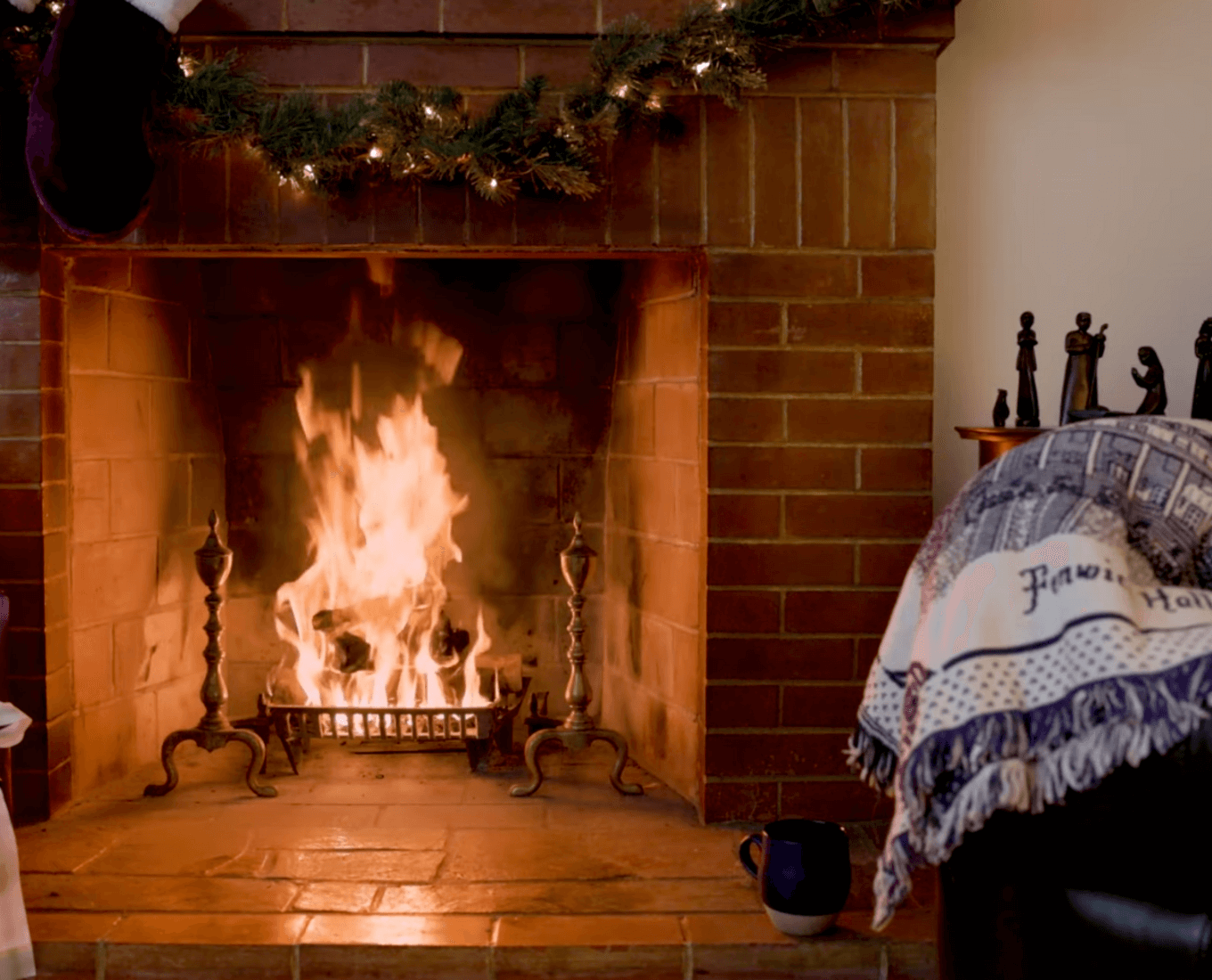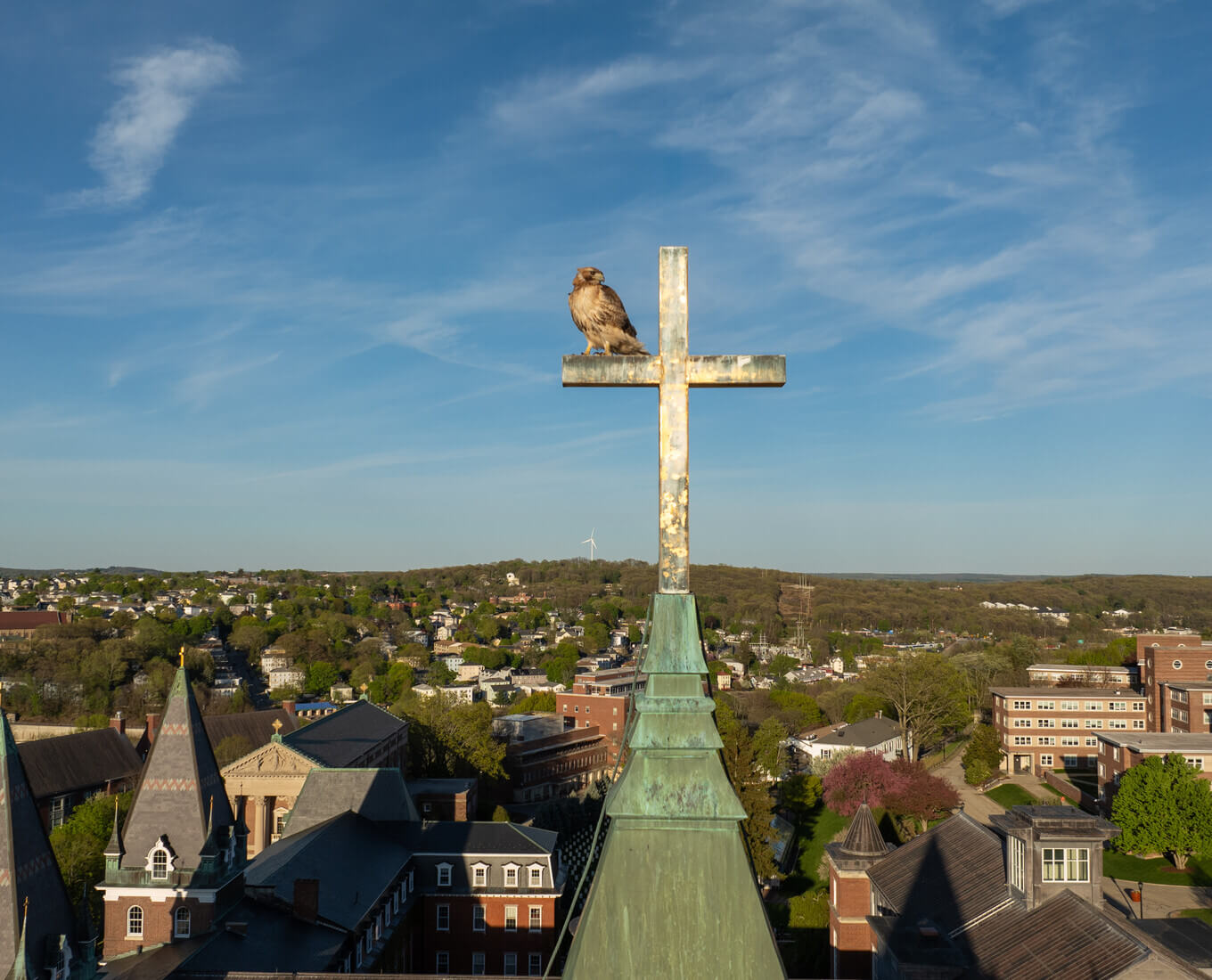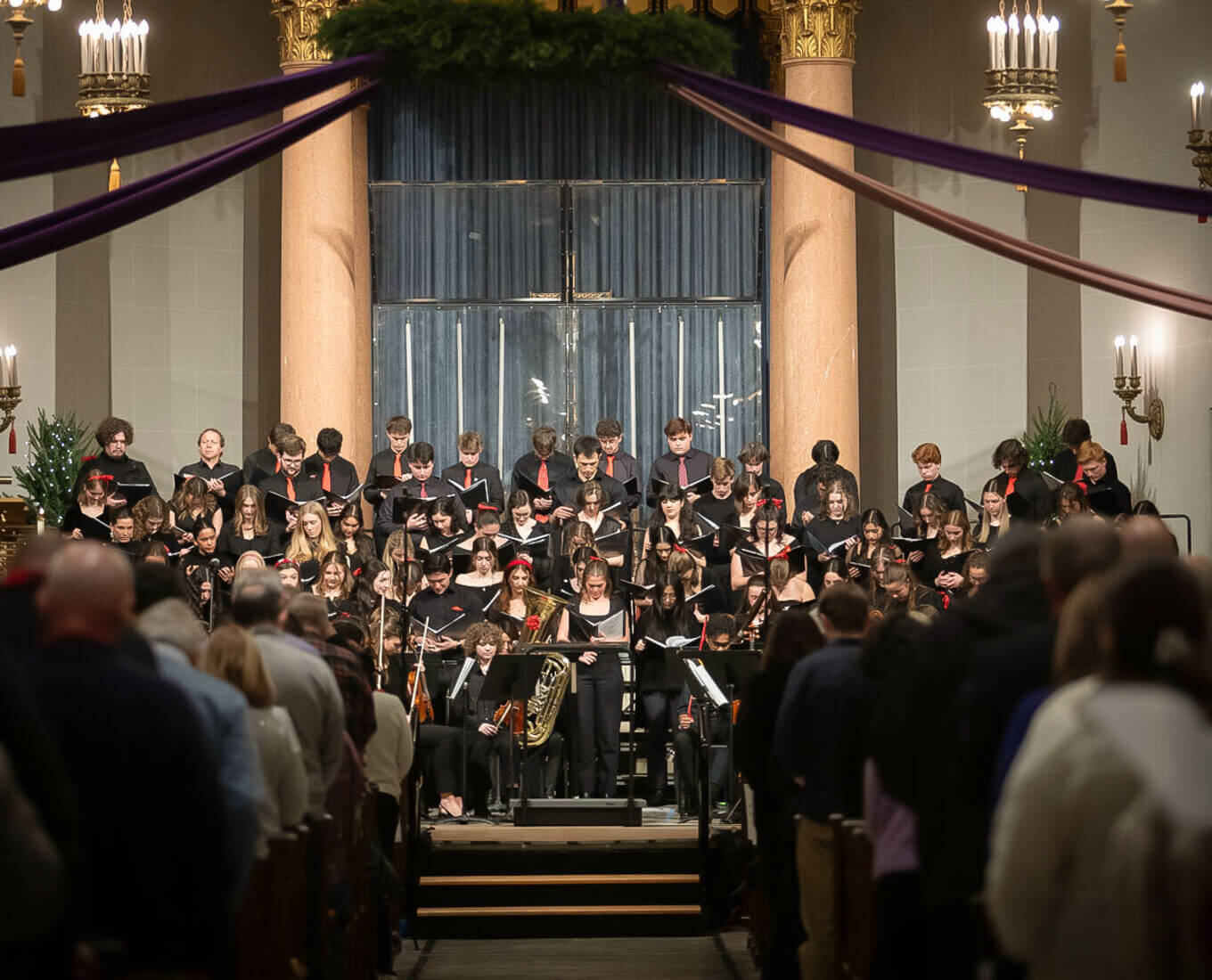Ron Lawson "75 had worked for 14 years as a financial analyst and manager for some of the biggest firms on Wall Street. So when he was suddenly laid off in the early 1990s recession, he didn't think much of it. "I figured with my professional and academic background, it would only take me two or three weeks to find another job," he says.
Three weeks stretched into three months, and then four or five, with no new job materializing. Despite his high-powered lifestyle, Lawson hadn't given much thought to savings — "everything I earned I wore on my back or on my feet," he says — and suddenly he found himself unable to pay his rent.
At age 39, he was homeless. "I wound up on the floor of a friend of a friend who I barely knew," he says, "and all I had to my name were three wardrobe boxes of clothes, a mattress and a sheet I used to pull over my head so that the roaches wouldn't crawl on me."
He spent the next six months without a home, without a job and feeling increasingly desperate. The only thing that kept him going was the kindness of friends, one of whom introduced him to a church in Brooklyn Heights led by civil rights icon Rev. Dr. Paul Smith.
"I'd go sit with him and we'd talk and pray, and he'd say, 'Hard times don't last always,'" Lawson remembers. Every time, Smith would give him an envelope with a couple of subway tokens and a few dollars that would help him get his next meal. Finally, a good friend asked if he'd be willing to help manage finances for Mayor David Dinkins' re-election campaign, and suddenly Lawson went from homeless to managing the finances of an $11 million campaign.
But Lawson never forgot the kindness of everyone who helped sustain him during the time he had nothing. "I don't think I can ever repay you for everything you did for me," he told them. To a person, they replied: "We don't expect you to. We just expect you to do it for someone else."
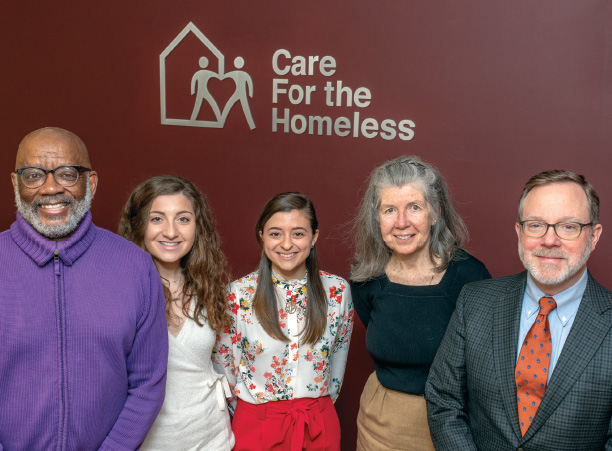 Lawson stands with Holy Cross students at Care for the Homeless. Photo by Louie Despres
Lawson stands with Holy Cross students at Care for the Homeless. Photo by Louie DespresOn any given night, there are over 62,000 people sleeping in New York City shelters — including more than 23,000 children — but the actual population of homeless is estimated to be much higher.
"If the homeless population of New York was its own stand-alone city, it would be one of the 10 largest cities in the state," Lawson notes. CFH not only provides emergency medical care to homeless people, but it also provides them with primary care doctors who can help them overcome chronic conditions and ensure continuity of care. As a sign of its success, the state recently awarded the organization with grants totaling $7.5 million, which will enable it to dramatically expand its services. But the organization still struggles to provide care for a population that only continues to rise. The issue has reached epidemic status in New York City, where homelessness is at its highest levels since the Great Depression, according to statistics from the organization Coalition for the Homeless.
Making His Way to The Hill
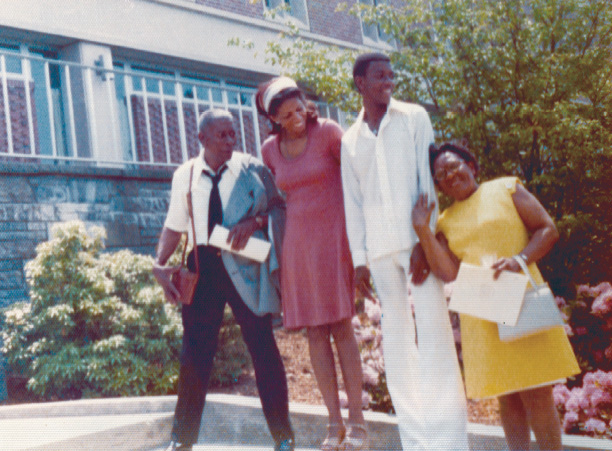 Lawson with his father, sister-in-law and stepmother outside the Hogan Center after commencement. Photo courtesy of Ron Lawson
Lawson with his father, sister-in-law and stepmother outside the Hogan Center after commencement. Photo courtesy of Ron LawsonLawson loved everything about his Holy Cross years, especially piling into the Black Student Union van on weekends and driving to parties at Wellesley, Radcliffe or Mount Holyoke. "I graduated near the bottom of my class because I spent a good portion of my time hanging out and not as much time studying as I should have," he admits.
After graduating with a degree in political science, he attended the Summer Skills Institute at the School of Urban and Public Affairs (now Heinz College) at Carnegie Mellon University, where he was initially overwhelmed by the heavy quantitative focus. He buckled down in calculus and statistics, however, and not only completed the summer institute but also earned a scholarship to the master's program. He called to tell his dad the good news and drove home from Pittsburgh to New York the next day, only to learn his dad had died overnight of a massive heart attack. "I literally went from the best four years of my life to the worst two," he says.
He credits his studies at Holy Cross, however, for allowing him to succeed at Carnegie Mellon and receive an M.S. in public policy and management. Upon graduation, he landed a job as an auditor at Arthur Young & Company (the precursor to Ernst & Young), the first of a series of Wall Street positions at firms including Solomon Brothers, Chase and Deloitte & Touche. When he suddenly found himself homeless in the early 1990s, it was his family that was uppermost in his mind.
"My mother died of breast cancer at the age of 48, when I was 17, and my dad died of a heart attack at the age of 57, when I was 23, so I had convinced myself they had worked themselves into an early grave to ensure my success, and here I was sleeping on someone's roach-infested floor," Lawson says.
After finishing his work with the Dinkins campaign, he took a job as national head of operations for the YWCA, the start of a career turnaround providing operations and financial management, as well as consulting for nonprofits. "I realized if I went to work and did a good job, somebody somewhere would be a little better off, and I liked the way that made me feel," he says.
Lawson joined Care for the Homeless in 2016 as its chief operating officer. Under the leadership of Executive Director George Nashak, Lawson is responsible for the operations and administrative oversight of the organization. CFH also runs its own shelter, a 200-bed facility for women living with mental illness. Clients can also access housing and job assistance. "It's been in existence for 10 years and over 1,000 women have been placed in permanent housing," Lawson says. Additionally, the organization plans to open community-based medical centers in neighborhoods with large numbers of underserved and homeless populations, providing medical care even to those who may not feel comfortable coming into shelters.
Intrinsic Motivation and Mentorship
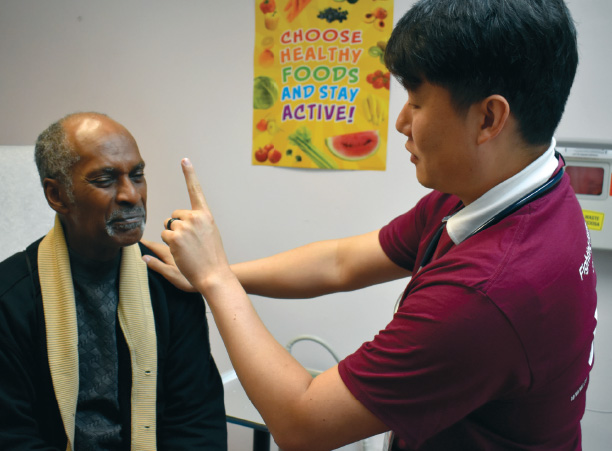 A Care for the Homeless patient receives medical care. Photo courtesy of Ron Lawson
A Care for the Homeless patient receives medical care. Photo courtesy of Ron LawsonCFH served over 7,500 patients last year; the new state grants will help expand services to more than 10,000 patients. That has meant a total transformation of Lawson's job in order to meet the new demand. "We ended the last fiscal year as a $20 million organization with 130 employees and next year we will be a $32 million organization with over 200 employees," he says. "We are growing by more than 50 percent in a year." Among other growth initiatives, Lawson and Dr. Regina Olasin, D.O., CFH's chief medical officer, are overseeing the opening of several new health centers in vulnerable neighborhoods.
In that area, Lawson has found help via several Holy Cross students who have interned at CFH. For as long as she can remember, Daniela Fazio '18 has wanted to be a doctor. While at Holy Cross, she volunteered with Student Programs for Urban Development (SPUD), serving as student director at Worcester's Cambridge Street Family Shelter during her freshman and sophomore years. Junior and senior years, she worked as a liaison between SPUD volunteer sites involved with meeting the hunger and homelessness needs of Worcester.
"It was really exciting for me to take on an internship where I could merge my career interest and my passion for helping this particular population," she says. While at CFH, Fazio used software to analyze New York neighborhoods to identify those most in need of a new center and helped introduce child literacy materials in the health centers. After graduating last May with a degree in psychology, she started work at NYU Langone Health Center, conducting research on how to keep at-risk emergency department patients from becoming homeless. "CFH was such an incredible stepping stone and learning experience for me," she says.
Over the past two years, Christian Haynes '20 and Julia D'Ambrosio '20 have continued the neighborhood analysis work and helped Lawson obtain information necessary for building the new centers. Going to her first homeless shelter was an emotional experience for D'Ambrosio: "I saw many kids and families, and often these are people who have jobs, but just can't find affordable housing. It's hard to see people at this point in their life, but it's been very motivating to be surrounded by people who are working hard to break the cycle."
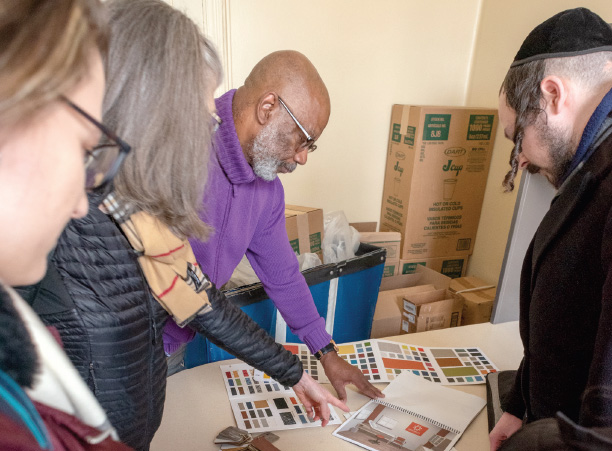 Lawson and his Care for the Homeless team discuss finishing the organization's new facilities serving New York's homeless. Photo by Louie Despres
Lawson and his Care for the Homeless team discuss finishing the organization's new facilities serving New York's homeless. Photo by Louie DespresEven though her internship ended two years ago, Fazio is still in regular contact with Lawson, who has served as a sounding board for her homelessness research and has also connected her with other Holy Cross alumni in New York.
"He loves Holy Cross more than anyone I know and has shared many stories about the meaningful experiences he had there," says Fazio, who remembers finding him decked out head to toe in Holy Cross gear in their first interview on campus. "He embodies what it means to be a crusader for others — he lives out the Jesuit mission of being a person that is for and with others in everything he does and he is such an inspiring role model."
And just as Lawson swore to honor those who helped him by helping others, it is a lesson he intrinsically imparts to a new generation.
"He has done so much for me," Fazio says. "The only way I could repay him is to do the same for others."
Written by Michael Blanding for the Spring 2019 issue of Holy Cross Magazine.
About Holy Cross Magazine Holy Cross Magazine (HCM) is the quarterly alumni publication of the College of the Holy Cross. The award-winning publication is mailed to alumni and friends of the College and includes intriguing profiles, make-you-think features, alumni news, exclusive photos and more. Visit magazine.holycross.edu/about to contact HCM, submit alumni class notes, milestones, or letters to the editor.
